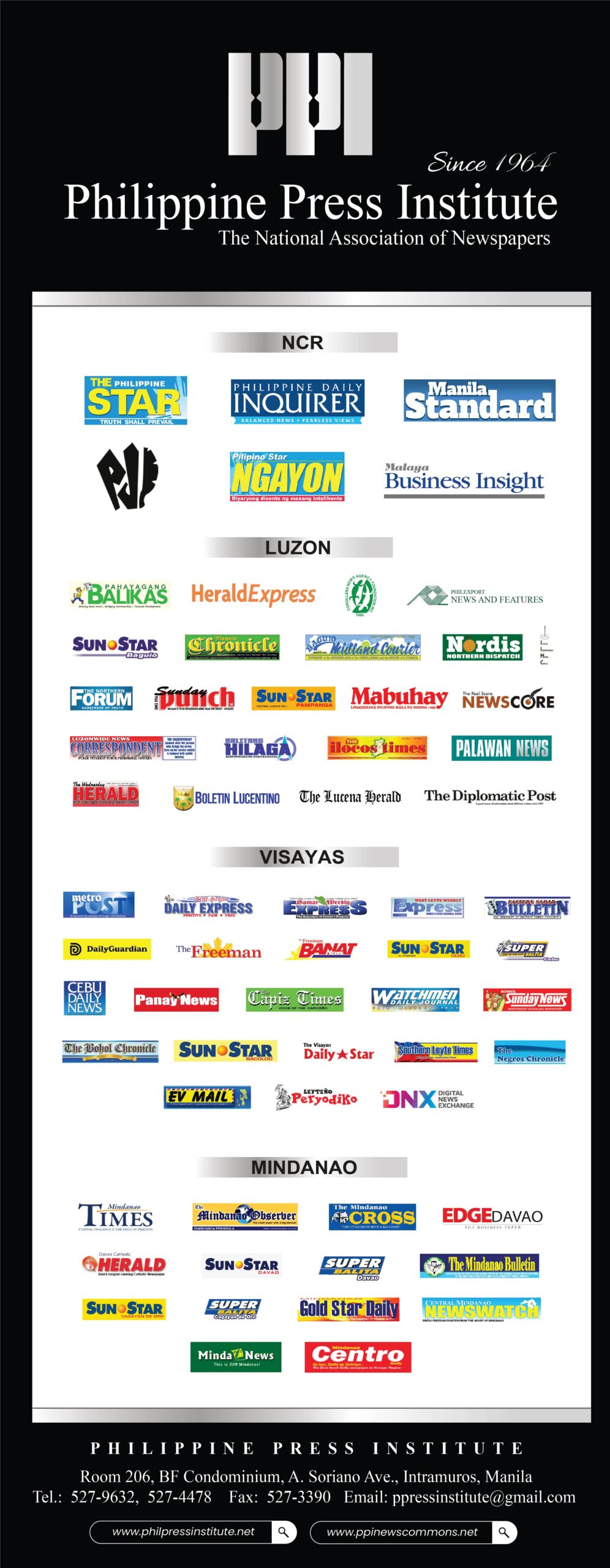The Philippine Press Institute (PPI), also known as the national association of newspapers and considered the oldest professional media organization in the country,
is a non-stock, non-profit private organization duly registered with the Securities and Exchange Commission whose principal mandate is to defend press freedom and promote ethical standards for the professional development of the Filipino journalist.
Founded in 1964 and reactivated in 1987, it was rendered moribund during the martial law regime (1972 – 1986). July 3, 1986 marked the formal revival of the Institute when the reconstituted Board of Governors met for the first time. On June 8, 1987, it became an incorporation under Philippine laws.
Also known as the national association of newspapers, it represents the interests and concerns of the newspaper sector in media and in all forums. Its membership includes most of the major national and provincial daily and weekly newspapers in the country.
The institute conducts training programs and organizes educational activities for Filipino journalists, seeks to protect their rights and freedoms in the pursuit of their practice, creates and introduces opportunities for the development of the journalist as a practitioner.
Programs and Activities
PPI’s flagship programs are Civic Journalism, National Press Forum, and the Community Press Awards.
With its local partners, the institute plans and implements regular seminars and workshops on writing, libel and ethics, newspaper management, and coverage of special interest activities, i.e. environment, business and economy, health, science and technology, children’s rights, women’s issues, ethnic conflicts, governance, elections and surveys, multimedia, social media, among others. It conducts occasional roundtable discussions among editors and publishers on ethics and industry affairs.
PPI organizes the annual National Press Forum and General Membership Meeting. For twenty-one years, this back-to-back event has gathered publishers and editors who represent the member-publications to discuss media issues and industry concerns. The first annual meeting was held in April 1988 at the historic Puerta Isabel in Intramuros. The first dual event was organized in April 1996. In 2008, the Institute opened the Forum by invitation to select non-members and non-media from the academe, business, government, and civil society.
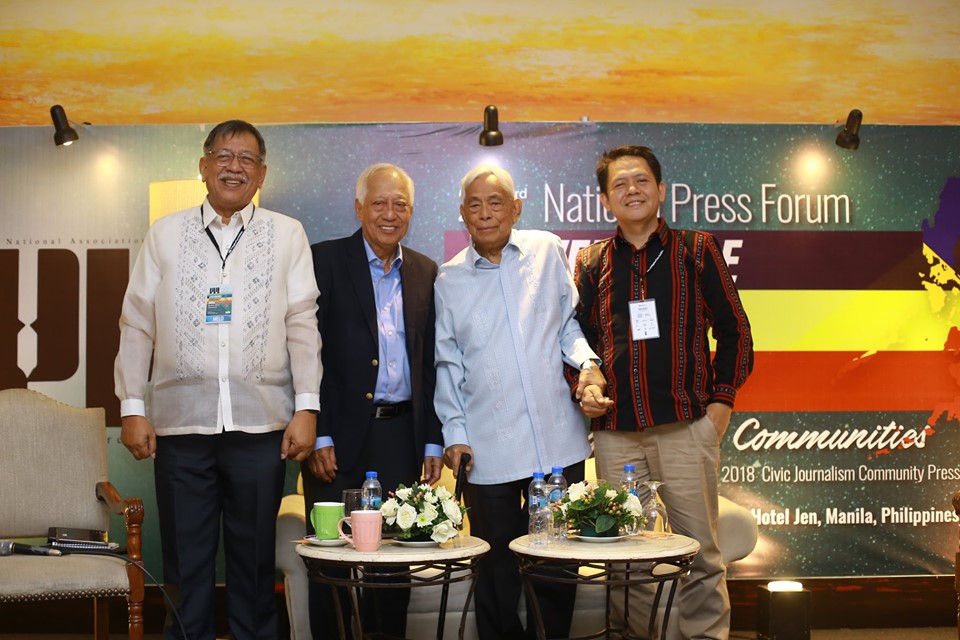
PPI oversees the management of the Annual Civic Journalism Community Press Awards program which was launched in 1996 in partnership with The Coca-Cola Export Corporation (TCCEC). The program honors community newspapers which have demonstrated journalistic excellence in various categories such as editing, editorial page, science and environment reporting, business and economic reporting and photojournalism. The Asian Institute of Journalism and Communication (AIJC) serves as the project secretariat. For four consecutive years, the National Commission on Culture and the Arts funded the special category on best culture, arts and history reporting.
Its current principal partner for its flagship programs is Nickel Asia Corporation (NAC). The partnership began in 2013 where two significant training programs were conducted namely, elections coverage and reporting natural capital, a new take in environmental reporting.
An official partnership with the Hanns Seidel Foundation (HSF) is in the works. The engagement started in the latter part of 2018 when both PPI and HSF agreed on doing a training series on federalism. This year, it is a minor sponsor for the 23rd National Press Forum
PPI supports media information and education activities of child-advocate agencies. It has organized press seminars and forums to support the causes on women and children under the auspices of the United Nations Children’s Fund (UNICEF) and Plan International Inc. – Philippines. It also trains future and aspiring journalists through the Scholastic Press Outreach Program which invites mass communication and journalism students to seminars and workshops whose resource persons are respected print media practitioners.

In the past, it had the opportunity to work as project partner with the Konrad Adenauer Foundation, Embassy of the United States (through its Small Grants Program), The Asia Foundation, Ramon Magsaysay Foundation, Metrobank Foundation, International Center for Journalists, Bank of Philippine Islands, ASEAN Centre for Biodiversity, and Oceana Philippines for skills training of its members.
It also had a partnership with The Coca-Cola Export Corporation (TCCEC) on Building Better Communities Through Civic Journalism. Started in year 2002, the project has organized 30 seminar-workshops across the country. In 2014, Coke- FEMSA supported the creation of four local press councils outside Metro Manila in Bacolod City, Pampanga, General Santos City, and Davao City. Holcim Philippines was also a program partner on media workshops and awards program on sustainable construction. It recently concluded its project with the Secretariat of the Philippine Extractive Industries Transparency Initiative (PH-EITTI) under the Department of Finance (DOF) on a training series and a journalism fellowship on covering the extractive industries.
In February 2017, the PPI started its seminar series on “fake news” or disinformation that was conducted in various university campuses nationwide. This ongoing scholastic program is being supported by Nickel Asia Corporation (NAC).
Linkages and Networking
The Philippine Press Council is composed of journalists and selected representatives from the legal profession, the business sector and the academe to protect and promote the news subject’s right to reply. It receives and acts on complaints against unfair practices of the press. The Editors’ Forum is a collegial body of senior editors of member newspapers that plan and implement activities to improve reportage of news events. It has expanded its membership to include a lawyer, an educator and a member of the civil society.
The United Print Media Group (UPMG) represents the business interests of the member-newspapers in the advertising industry. It also helps create marketing opportunities for member-community newspapers.
PPI and the Kapisanan ng Brodkaster sa Pilipinas (KBP) or the Association of Broadcasters of the Philippines continue to jointly address media concerns such as training, ethics, advocacy, technical, trade standards and government legislation. It sits as a permanent juror for its Golden Dove Awards.
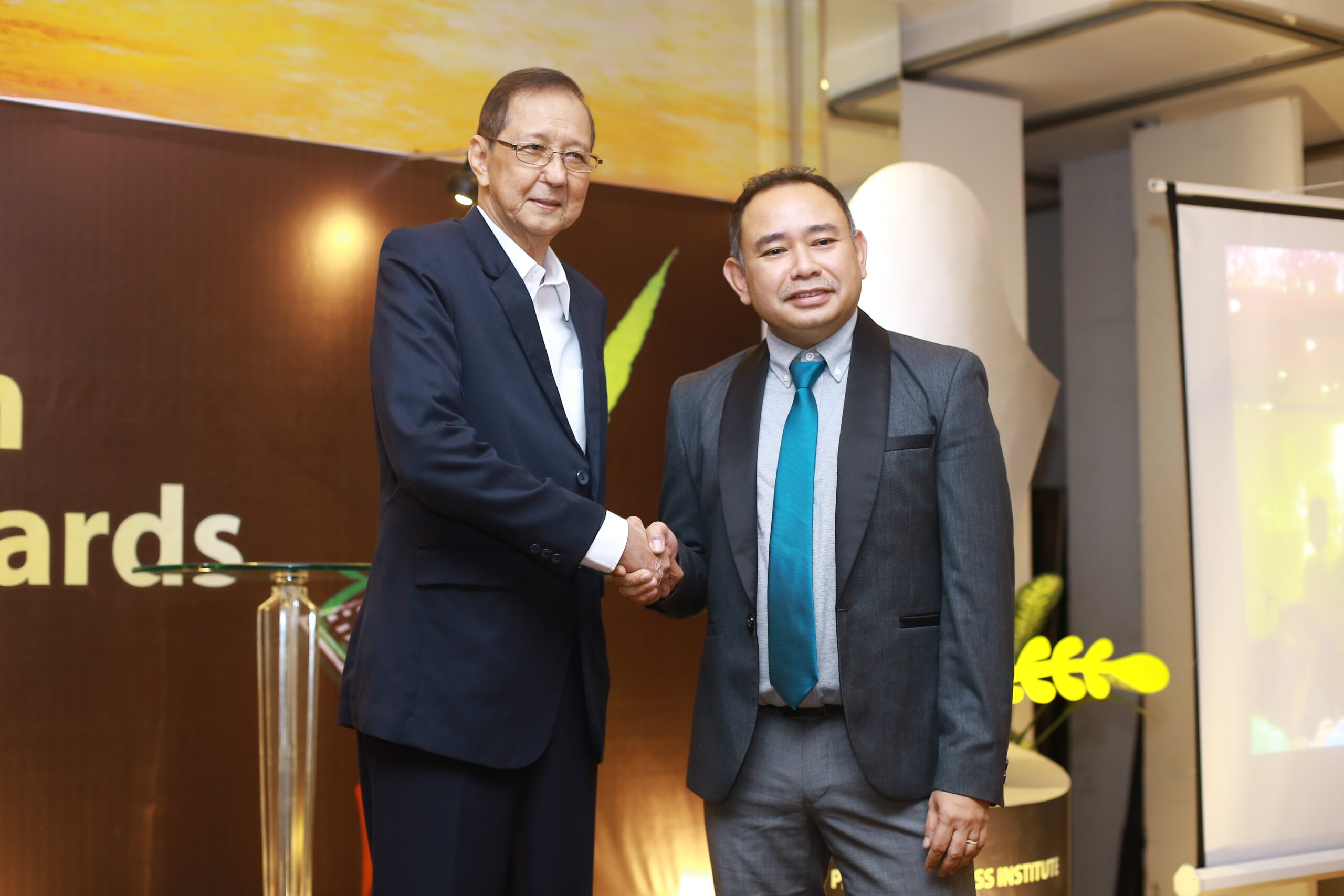
It collaborates and shares technical resources where it can with other media organizations such as Probe Media Foundation, Philippine Center for Investigative Journalism, Center for Media Freedom and Responsibility, Asian Institute for Journalism and Communication, Vera Files, National Union of Journalists of the Philippines, Center for Journalism at the Ateneo de Manila University, the Center for Community Journalism and Development, and independent agencies like the Philippines Communication Society, International Labour Organization, Marketing and Opinion Research Society of the Philippines, National Council for Children’s Television, University of the Philippines – Diliman Journalism Department, and Philippine Association for Media and Information Literacy.
It is one of the founders of the Council of Asian Press Institutes established in 1998 with other press institutes in Asia and the Pacific. PPI has been elected as the first standard bearer of this regional umbrella organization.
It is also one of the institutional members of the Freedom Fund for Filipino Journalists, along with KBP, CMFR, PCIJ and CCJD. Launched in January 2003, FFFJ was organized to address the numerous attacks against journalists and news organizations around the country.
It also coalesces with local press clubs for its advocacy against media killings and impunity.
It’s academic link is via the Philippines Communication Society (PCS), Philippine Association of Communication Educators (PACE), University of the Philippines – Diliman College of Mass Communication, and Asian Institute of Journalism and Communication (AIJC) has provided the institute venues for its Scholastic Press Program, an extension or outreach outside of its institutional media programs.
Research Studies
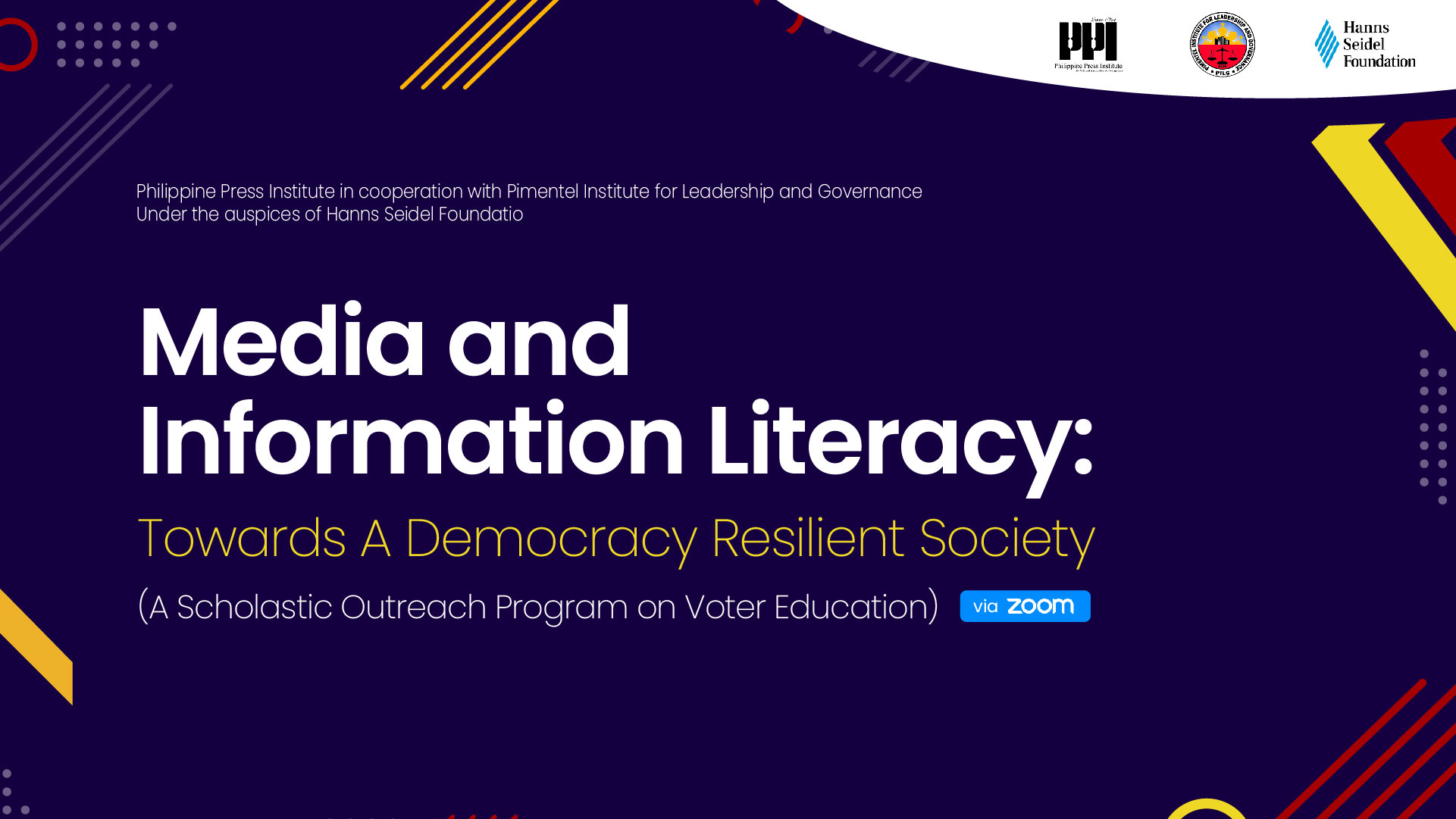
Research Study on Democracy Resilience and Media Literacy amid the Pandemic
For the first time, the PPI took on a research undertaking implemented by a university professor and her team who developed the strategies, methodologies, tools and instruments in the conduct of the study — from surveying of key respondents who were community journalists — to writing of results and recommendations. It involved an online orientation with key informants or respondents and a launch after completion of research. An achievement in itself, it resulted in the development of the module and program for the Scholastic. Under PPI’s tutelage, lead researcher Dr. Hemmady Mora was able to present the research before a local and international audiences in conferences.
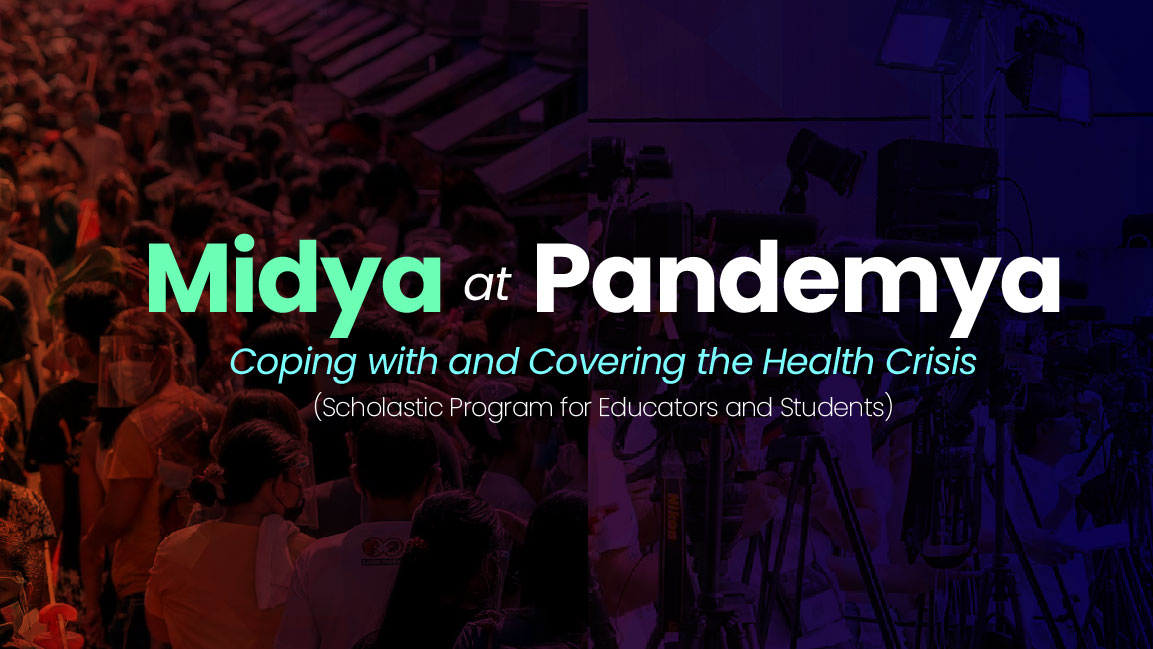
Reporting in the Time of ‘New Normal’: Journalism amid the Covid-19 pandemic
This year’s series of scholastic outreach program for academic institutions, themed “Media at Pandemya”, coping with and covering the health crisis, organized by the Philippine Press Institute, in collaboration with the Journalism Studies Association of the Philippines (JSAP) with the support of Hanns Seidel Foundation Inc. is based on a research conducted by Prof. Felipe Salvosa II and Asst. Prof. Christian Esguerra both from University of Santo Tomas.
In covering the pandemic, journalists struggle with the shrinking space for press freedom and limited access to information as they also grapple with threats to their physical and mental well-being. Digital media enable journalists to report even in quarantine, but new challenges such as wide circulation of health misinformation, disinformation and government controlling the narratives had emerged. On the other hand, journalists are faced with other challenges e.g. downsizing of news rooms and shutdown of community newspapers serving as critical sources of pandemic-related information.
It collaborates and shares technical resources where it can with other media organizations such as Probe Media Foundation, Philippine Center for Investigative Journalism, Center for Media Freedom and Responsibility, Asian Institute for Journalism and Communication, Vera Files, National Union of Journalists of the Philippines, Center for Journalism at the Ateneo de Manila University, the Center for Community Journalism and Development, and independent agencies like the Philippines Communication Society, International Labour Organization, Marketing and Opinion Research Society of the Philippines, National Council for Children’s Television, University of the Philippines – Diliman Journalism Department, and Philippine Association for Media and Information Literacy.
It is one of the founders of the Council of Asian Press Institutes established in 1998 with other press institutes in Asia and the Pacific. PPI has been elected as the first standard bearer of this regional umbrella organization.
It is also one of the institutional members of the Freedom Fund for Filipino Journalists, along with KBP, CMFR, PCIJ and CCJD. Launched in January 2003, FFFJ was organized to address the numerous attacks against journalists and news organizations around the country.
It also coalesces with local press clubs for its advocacy against media killings and impunity.
It’s academic link is via the Philippines Communication Society (PCS), Philippine Association of Communication Educators (PACE), University of the Philippines – Diliman College of Mass Communication, and Asian Institute of Journalism and Communication (AIJC) has provided the institute venues for its Scholastic Press Program, an extension or outreach outside of its institutional media programs.
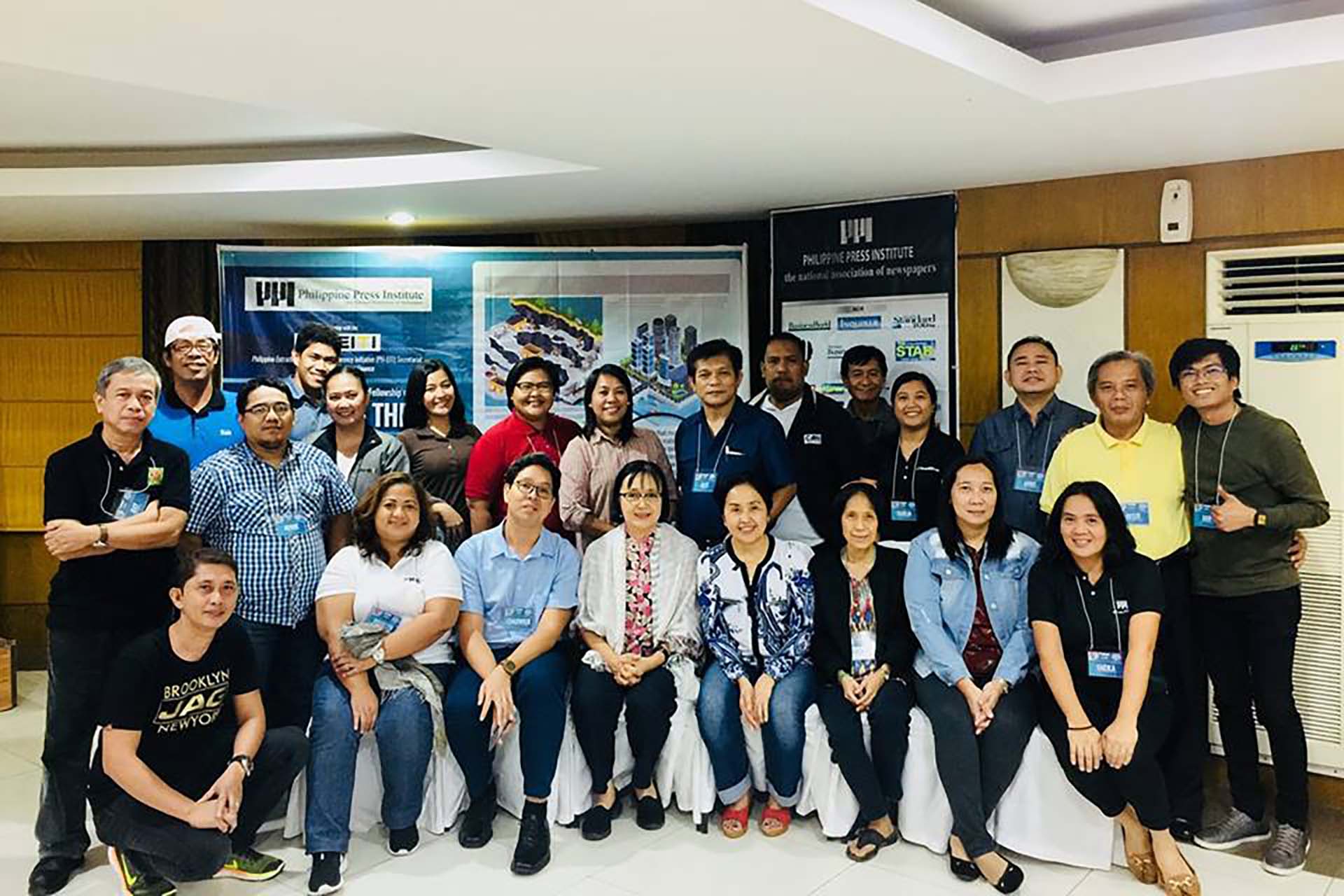

Media Advocacies
PPI continues to work closely with other media organizations in the fight against media killings, impunity, attacks and violence against media workers – and for the passage of the Freedom of Information Act (FOI). It crafts and disseminates statements and positions on media-related issues such as press freedom and the welfare of journalists. It sits in the Presidential Task Force on Media Security (PTFoMS) as an observer and resource person alongside other select-media organizations. It is also a member of the Journalists Safety Advisory Group (JSAG) whose secretariat is AIJC.
